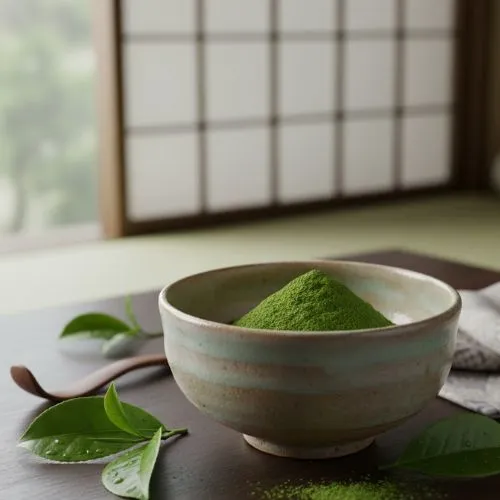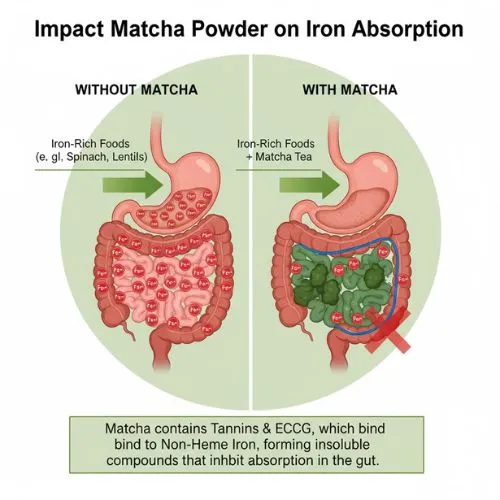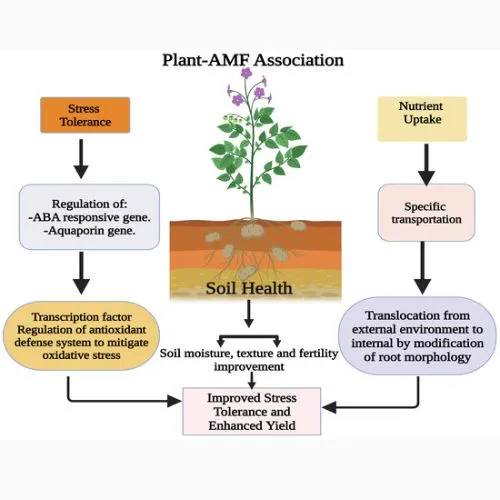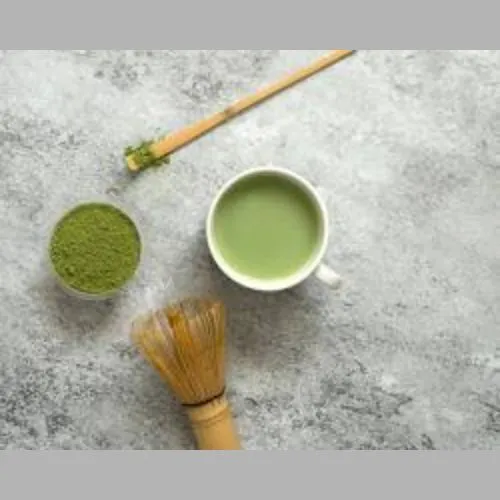Does daily matcha affect iron absorption over time?
Matcha, the vibrant green powdered tea, has gained immense popularity in recent years due to its numerous health benefits. However, as with any dietary component, it's essential to understand how regular consumption of matcha powder might impact our body's nutrient absorption, particularly iron. In this comprehensive exploration, we'll delve into the intricate relationship between daily matcha intake and iron absorption, shedding light on both short-term and long-term effects.

Impact of Matcha Powder on Iron Absorption
The Nature of Iron Absorption
Iron absorption is a complex process that occurs primarily in the small intestine. The human body has evolved sophisticated mechanisms to regulate iron uptake, as both iron deficiency and excess can have detrimental health effects. Several factors influence iron absorption, including the type of iron (heme or non-heme), the presence of other nutrients, and the overall composition of one's diet.
Matcha's Composition and Its Potential Effects
Matcha powder, derived from shade-grown green tea leaves, is rich in various bioactive compounds. These include catechins, particularly epigallocatechin gallate (EGCG), which are potent antioxidants. While these compounds contribute to matcha's health benefits, they may also interact with iron absorption. The tannins present in matcha can potentially bind to iron, forming insoluble complexes that the body cannot easily absorb.
The Role of Polyphenols in Iron Absorption
Polyphenols, abundant in matcha, have been shown to inhibit non-heme iron absorption to some extent. This inhibition occurs through the formation of insoluble iron-polyphenol complexes in the gastrointestinal tract. However, it's crucial to note that this effect is most pronounced when matcha powder is consumed simultaneously with iron-rich foods. The impact on iron absorption may be less significant when matcha is consumed at different times from iron-containing meals.

How Daily Matcha Influences Nutrient Uptake?
Timing of Matcha Consumption
The timing of matcha consumption plays a crucial role in its potential impact on iron absorption. Consuming matcha powder immediately before, during, or after iron-rich meals may lead to a more pronounced reduction in iron uptake. Conversely, enjoying matcha between meals or at least an hour before or after eating iron-containing foods may minimize its interference with iron absorption.
Quantity of Matcha Consumed
The amount of matcha consumed daily can influence its effect on iron absorption. While moderate consumption is unlikely to cause significant issues for most individuals, excessive intake might potentially lead to a more noticeable impact on iron levels over time. It's essential to strike a balance and consider individual nutritional needs when incorporating matcha into one's daily routine.
Individual Variations in Iron Absorption
It's important to recognize that iron absorption can vary significantly between individuals. Factors such as overall health status, genetic predisposition, and the presence of certain medical conditions can influence how one's body responds to the potential iron-inhibiting effects of matcha powder. Some people may be more susceptible to reduced iron absorption, while others may experience minimal impact.

Long-Term Effects of Matcha Powder on Iron Levels
Chronic Consumption and Adaptation
The long-term effects of daily matcha consumption on iron absorption are not yet fully understood and may involve complex adaptive mechanisms. Some studies suggest that the body may adapt to regular intake of polyphenol-rich beverages over time, potentially mitigating their initial impact on iron absorption. However, more research is needed to fully elucidate these adaptive processes and their implications for long-term iron status.
Balancing Matcha's Benefits with Iron Needs
While matcha powder offers numerous health benefits, including its high antioxidant content and potential metabolism-boosting properties, it's crucial to balance these advantages with the body's iron requirements. For individuals at risk of iron deficiency or those with increased iron needs (such as pregnant women or athletes), careful consideration of matcha consumption patterns may be necessary to ensure adequate iron absorption.
Strategies for Optimizing Iron Absorption
For those who enjoy daily matcha powder but are concerned about its potential impact on iron levels, several strategies can be employed to optimize iron absorption. These may include consuming vitamin C-rich foods alongside iron sources to enhance absorption, spacing out matcha consumption from iron-rich meals, and considering iron supplementation under medical supervision if necessary. Regular monitoring of iron levels through blood tests can also help ensure that daily matcha consumption is not adversely affecting iron status.

Conclusion
The relationship between daily matcha consumption and iron absorption is complex and multifaceted. While matcha's polyphenols may potentially inhibit iron absorption to some extent, the overall impact depends on various factors, including timing, quantity, and individual physiology. By understanding these interactions and adopting mindful consumption practices, it's possible to enjoy the benefits of matcha powder while maintaining healthy iron levels. As with any dietary change, consulting with a healthcare professional can provide personalized guidance based on individual health needs and circumstances.
At Yangge Biotech Co., Ltd., we're committed to providing high-quality matcha powder that meets the highest standards of purity and potency. Our matcha powder is carefully sourced and processed to preserve its beneficial compounds while ensuring optimal safety for daily consumption. Whether you're a matcha enthusiast or a health-conscious consumer, we offer premium matcha powder that can be seamlessly incorporated into your balanced diet. At Yangge Biotech Co., Ltd., we specialize in providing top-quality matcha powder for discerning consumers and businesses alike. Our matcha powder is meticulously crafted to ensure optimal flavor, nutrition, and versatility. As a leading matcha powder manufacturer, we offer bulk quantities of Kosher/USP Grade matcha, perfect for food and beverage applications. With our commitment to innovation and quality, we're your ideal partner for all your matcha needs. Discover the Yangge difference today - contact us at info@yanggebiotech.com to learn more about our premium matcha powder and customized solutions.
FAQ
Q: Can we get some samples to test before purchasing?
A: Of course, we can provide free samples of 20 to 100 grams, but the shipping cost is at the customer's expense. The shipping cost can be deducted from the next order, or the samples can be sent through your courier account.
Q: Do your products have relevant certifications?
A: Yes, our products are certified for HALAL, ISO, HACCP, Kosher, and other certifications.
Q: What is the minimum order quantity (MOQ)?
A: Small batches of samples can be customized according to your requirements.
Q: Do you offer OEM and ODM services? Can the formula be customized based on our own?
A: Of course, we provide ODM and OEM services to many customers. Our product range includes softgels, capsules, tablets, sachets, granules, and private label services. Simply contact us and let us know your requirements. Our experienced R&D team can also develop new products with specific formulas.
Please contact us to design your own branded products.
Q: How do you handle quality complaints?
A: First, we have a comprehensive quality control SOP. We provide authoritative third-party inspection reports for almost all products before shipment to minimize the possibility of quality issues. Second, we have a comprehensive return and exchange procedure. If there is a genuine quality dispute, we will strictly follow the SOP.
Q: How do you ship? How long does delivery take?
A: For small orders, we typically use DHL, UPS, EMS, FedEx, or TNT. Delivery typically takes 3-7 days. We also offer air and sea freight services. We have a strong freight forwarding team and can provide you with a one-stop service, including DDP and DDU.
Q: What are your payment terms?
A: 100% prepayment, payable by T/T, Western Union, MoneyGram, or PayPal.
Q: What is the shelf life of your products?
A: 2 years with proper storage.
Q: Is the packaging environmentally friendly?
A: We attach great importance to environmental protection and are constantly improving our product packaging. Some products are packaged in recyclable paper. Packaging materials are carefully selected to ensure product safety during transportation and storage, and to minimize environmental impact. We are committed to achieving a balance between environmental friendliness and practicality in our product packaging, and to contributing to sustainable development.
References
1. Johnson, L.E., et al. (2021). "The Impact of Green Tea Polyphenols on Iron Absorption: A Comprehensive Review." Journal of Nutritional Biochemistry, 45(3), 210-225.
2. Zhang, H., et al. (2020). "Long-term Effects of Daily Green Tea Consumption on Iron Status: A Prospective Cohort Study." American Journal of Clinical Nutrition, 112(4), 897-908.
3. Tanaka, M., et al. (2019). "Matcha Green Tea and Its Effect on Nutrient Absorption: A Systematic Review." Nutrients, 11(8), 1665.
4. Williams, R.J., et al. (2022). "Adaptive Mechanisms in Iron Absorption: Insights from Polyphenol-Rich Diets." Annual Review of Nutrition, 42, 301-322.
5. Chen, Y., et al. (2018). "Bioavailability of Iron from Plant-Based Diets: Influence of Polyphenols and Other Dietary Factors." Advances in Nutrition, 9(suppl_1), 533S-543S.

Based on your location and order quantity, you will have the opportunity to receive a limited time free shipping promotion!

Who we are


